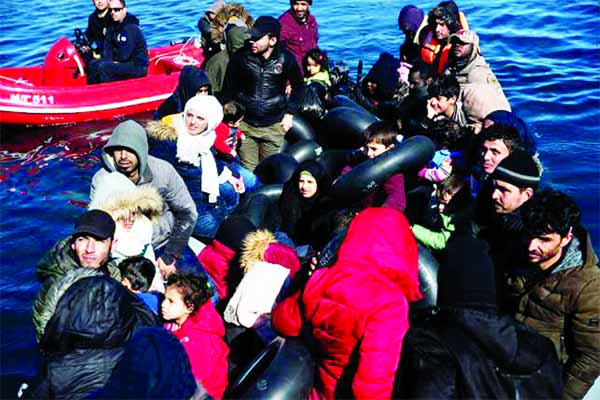
Reuters, Kastanies/Lesbos :
Greek police fired tear gas to repel hundreds of stone-throwing migrants who sought to force their way across the border from Turkey on Sunday, witnesses said, with thousands more behind them after Ankara relaxed curbs on their movement.
It was the second straight day of clashes at the border crossing by the northeastern Greek town of Kastanies in which police drove back approaching migrants with volleys of tear gas.
Greece had placed its borders on maximum-security footing earlier on Sunday after hundreds of other migrants used porous crossing points to enter the country.
At least 500 people had arrived by sea on the Greek islands of Lesbos, Chios and Samos close to the Turkish coast within a few hours on Sunday morning, police said.
Along the northeastern mainland border, some migrants waded across a shallow section of the Evro River to the Greek side. Witnesses said there were groups of up to 30, including an Afghan mother with a five-day-old infant, by the side of a road after having forded the river.
The clashes occurred later in the day at the Kastanies crossing after riot police reinforced security there. No further details were immediately available as police were escorting reporters away from the scene, citing safety considerations.
A Greek government source said some migrants blocked from crossing had also thrown metal bars and hand-held tear gas canisters at police on the Greek side.
Turkey said on Thursday it would no longer restrain hundreds of thousands of asylum seekers in its territory from reaching Europe, their preferred destination, despite a commitment to do so under a deal reached with the European Union in 2016.
Turkey’s turnabout came after an air strike killed 33 Turkish soldiers in northwest Syria where Ankara has deployed forces in support of rebels and to help secure its border against a new influx of refugees from the Syrian civil war.
Turkey has said funds promised by the EU to help it deal with 3.7 million Syrian refugees already in the country has been slow to arrive; Ankara had threatened several times in the past to open the floodgates if it did not receive more support.
The EU, its relations with Turkey tense over President Tayyip Erdogan’s crackdown on dissent and hydrocarbon drilling off Cyprus, scrambled to respond to the new migrant crisis.
Greek police fired tear gas to repel hundreds of stone-throwing migrants who sought to force their way across the border from Turkey on Sunday, witnesses said, with thousands more behind them after Ankara relaxed curbs on their movement.
It was the second straight day of clashes at the border crossing by the northeastern Greek town of Kastanies in which police drove back approaching migrants with volleys of tear gas.
Greece had placed its borders on maximum-security footing earlier on Sunday after hundreds of other migrants used porous crossing points to enter the country.
At least 500 people had arrived by sea on the Greek islands of Lesbos, Chios and Samos close to the Turkish coast within a few hours on Sunday morning, police said.
Along the northeastern mainland border, some migrants waded across a shallow section of the Evro River to the Greek side. Witnesses said there were groups of up to 30, including an Afghan mother with a five-day-old infant, by the side of a road after having forded the river.
The clashes occurred later in the day at the Kastanies crossing after riot police reinforced security there. No further details were immediately available as police were escorting reporters away from the scene, citing safety considerations.
A Greek government source said some migrants blocked from crossing had also thrown metal bars and hand-held tear gas canisters at police on the Greek side.
Turkey said on Thursday it would no longer restrain hundreds of thousands of asylum seekers in its territory from reaching Europe, their preferred destination, despite a commitment to do so under a deal reached with the European Union in 2016.
Turkey’s turnabout came after an air strike killed 33 Turkish soldiers in northwest Syria where Ankara has deployed forces in support of rebels and to help secure its border against a new influx of refugees from the Syrian civil war.
Turkey has said funds promised by the EU to help it deal with 3.7 million Syrian refugees already in the country has been slow to arrive; Ankara had threatened several times in the past to open the floodgates if it did not receive more support.
The EU, its relations with Turkey tense over President Tayyip Erdogan’s crackdown on dissent and hydrocarbon drilling off Cyprus, scrambled to respond to the new migrant crisis.

